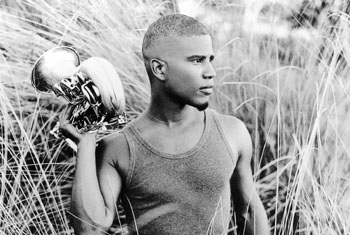![[Metroactive Music]](/music/gifs/music468.gif)
[ Music Index | Silicon Valley | Metroactive Home | Archives ]
Mosaic Man
Saxophonist David Sanchez uses jazz to interpret traditional rhythms
By Chuy Varela
HE MUSIC WE play is very difficult, and one has to prepare and warm up. It's like going into a boxing ring," says jazz saxophonist David Sanchez in Spanish a couple of hours before his show at Seattle's Jazz Alley last week. "It's a lot of work. We just did an East Coast tour and a few dates in Europe, and it was great. Now we're going to try something new and see what happens here on the West Coast."
That something new happens Monday (Dec.10), when Sanchez will lead a master class and concert at Le Petit Trianon Theatre in downtown San Jose. Co-presented by the San Jose Jazz Society and the music and dance department at San Jose State University, the event is a great opportunity for South Bay audiences to experience what has made this 33-year-old one of the leading jazz players on the scene today.
Currently topping the straight-ahead jazz charts with his Columbia Records release Travesia (The Crossing), his sixth album as a leader, Sanchez creates a complex mosaic by combining the folkloric roots of his native Puerto Rico with cutting-edge jazz.
"This album has a bit of the same flavor my last album, Melaza, had," he continues. "We added different folkloric instruments like the cajon (wood box drum) and use the bomba and plena rhythms, but with a different sonic approach that's more subtle. What we are doing is a jazz interpretation of these traditional rhythms. [We're] not trying to play them in a conventional way."
Since he arrived in New York City in 1988, Sanchez has been on the go. Important freelance gigs with Paquito D'Rivera, Claudio Roditi and Eddie Palmieri gave him a firm footing that landed him in Dizzy Gillespie's United Nation Orchestra in the early 1990s. A strong, provocative tone on tenor and soprano sax coupled with the post-bop influences of masters like John Coltrane helped transform him into a world-class player; stints with Roy Haynes, McCoy Tyner and Elvin Jones imparted further performing experience.
Born in Guaynabo, Puerto Rico, Sanchez began playing congas at age 8 and picked up his first tenor sax at 12. Soon after, he discovered jazz but wasn't sure whether music would be his career. As a psychology student at the University of Puerto Rico, he joined the pivotal group Batacumbele, which integrated a spirit of experimentation with an adherence to roots. It set Sanchez on a course that since his 1994 debut album, The Departure, has revealed an intriguing musical personality.
"I'm trying to give Latin rhythms a different color," he explains. "Onstage, the way we communicate is through improvisation, and jazz is the context we use to explore and expose elements that come from the Caribbean and other Latin American countries. But the harmonies are also very important and draw from the ideas of Charles Mingus, Ornette Coleman, 1960s Miles Davis and classical music. These are approaches I've been working toward for a long time that give our fusion distinction."
With advanced compositional skill and a musical virtuosity that allows for complex interplay, the songs on Travesia point to a new juncture for Sanchez. From Wayne Shorter's "Prince of Darkness" to his own "Paz Pa' Vieques‚" there's a spacious freedom that also resonates with brilliance on upbeat renditions of Harold Arlen's "Ill Wind" and the Puerto Rican folkloric song "La Maquina."
One of the interesting approaches Sanchez is using is the inclusion of the alto saxophone in combination with his tenor or soprano. He first tried it with Kenny Garrett on his Street Scenes album in 1996, but two years ago when Miguel Zenón joined the band, they took the duo texture to another level with an uncanny, almost psychic, sense of cohesion and dynamic on the frontline.
The master class workshop (free to all students) will explore the concepts Sanchez is using to create his music. "Tradition is a process that follows an evolution that takes all those things that came before us and gives them to us as tools to advance music," he says. "You have to experiment to get something different. For this West Coast tour, I'm trying something new by using the two saxophone frontline with only Hans Glawisching on bass and Antonio Sanchez drums. Everybody thinks that for jazz to have a Latin feeling, it has to have congas, and that's not true. It's important but not indispensable."
![]()

Something New: For his SJSU appearance, David Sanchez promises some new approaches.
The David Sanchez Quartet performs Monday (Dec. 10) at 7:30pm at Le Petit Trianon Theatre, 72 No. Fifth St., San Jose. Tickets are $10. The master class takes place at 4pm and is free. (408.995.5400)
From the December 6-12, 2001 issue of Metro, Silicon Valley's Weekly Newspaper.